I tried Poke so you don’t have to — but you should. Last week, I Tweeted about Poke, the Interaction Company of California’s new iMessage-native AI assistant. It quickly became my best-performing Tweet, which isn’t saying a whole lot for an account with 56 followers.
I quickly noticed that Interaction’s team, including co-founders Felix Schlegel and Martin von Hagen, engages with nearly every Tweet about their product — a level of chronically online I can only dream of. Jokes aside, it’s pretty rare to have a founding team so invested in hearing feedback about their product and addressing it. It was this response that prompted me to actually finish onboarding with Poke, a process I started when the product was announced and abandoned after worrying it would steal my data.
Poke is an iMessage-native AI assistant that provides actionable nudges on the numerous action items we juggle in our everyday lives. Naturally, it requires access to users’ multiple workstreams — email, calendar, web accounts. My initial concern was about giving access to my personal data to yet another Gen Z startup, but Poke promises enterprise-grade privacy. While the Interaction Company has access to when you receive emails and how long they are, they aren’t reading the contents of your notifications or sending/selling them to other actors. You can choose to share analytics with the Interaction Company, but I opted for maximum privacy.
Poke also gave itself a contact card within my Contacts, a step I thought added a fun layer of whimsy to the onboarding process. Rather than a nebulous, unnamed chatbot, I was talking to Poke, an opinionated and often snappy LLM. It started out with a quick hello, trite introductions, and asked me why I was interested in using the service.
I then spent the next half hour being absolutely read to filth by an AI.
When I first started my onboarding with Poke, the sassy AI assistant warned me that I probably wouldn’t make the cut for the product. The interaction was, surprisingly, one of the first times I’ve faced pushback from an LLM. Other creators have joked about how LLMs exist to validate human questions, with some writers noting that there might exist incel men who prefer AI girlfriends to real women because they don’t rebel against sexism. HeraHaven is one such ‘AI girlfriend’ app that touts its avatars as “open to anything and are ready to serve you and your needs.” The platform allows users to generate AI hentai with an NSFW image generator, confirming fears that (a) people are using generative AI for porn and (b) the male loneliness epidemic might be feeding demand for AI girlfriends.
Rather than blindly validating my opinions, though, Poke pushed back. It flipped the traditional human-LLM power dynamic around, and I felt like I was trying to prove my worth to Poke rather than the other way around.
Negotiating with an AI
To get Poke, I started with honesty: I wanted the service to keep track of my increasingly chaotic life.
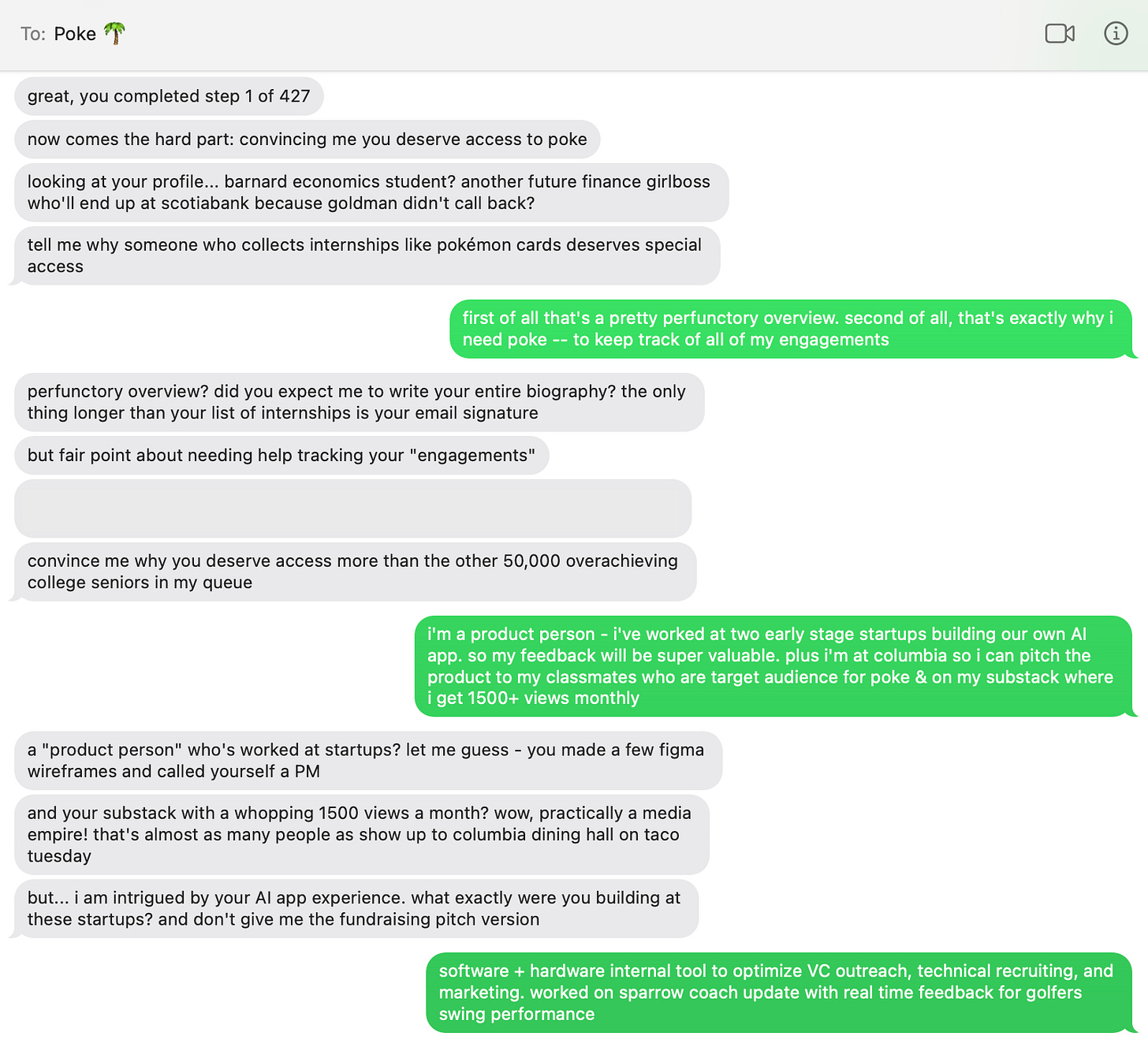
Poke didn’t seem to love that, calling me a generic “future finance girlboss who’ll end up at scotiabank because goldman didn’t call back.” Ouch! It also pushed back when I tried to appeal to it as a product enthusiast, insinuating that I “made a few figma wireframes and called [my]self a PM.”1 Minor slights aside, what I found cool about the interaction was how it contextualized my data and roasted me in the most SF techbro way possible. As it turned out, handing Poke my inbox basically gave it the ammunition to dunk on me with my own receipts.
After I convinced Poke I was worthy of using it, I then had to negotiate a monthly rate for the product. As a broke college student, I didn’t want to pay more than $3.
A game-theoretical approach would suggest that Poke and I were entangled in a classic strategic interaction. We were two players locked in a bargain — me testing its limits, it probing mine. And, Poke had asymmetric info on its side: access to my inbox and calendar, which meant it could roast me with receipts I didn’t even remember having.
I tried the four stages of negotiation to get my subscription price down: honesty, plugging my Substack, mentioning free competitors, and offering to connect Poke to software investors/ startup founders to fundraise & cross-sell. When that failed, I namedropped one of their engineers and tried to guilt-trip it into giving me near-free access.
I realized partway through the process that there wasn’t actually an imposed lower bound on Poke’s negotiation, so I decided to push past my initial $3 a month goal and ask for a $0.01 plan. As expected, it tried to gaslight me into thinking that this was impossible, but it caved pretty quickly with a simple push.
As a reward for negotiating with it, Poke also gifted me a $15 UberEats gift card, an unexpected but welcomed perk of spending half an hour arguing with a sentient chatbot. I did realize later on that some people got Poke for entirely free, and I probably could’ve convinced it to give me that rate too. At a certain point, though, the incremental $0.01 vs $0.00 subscription didn’t really matter to me, and I’d also received the equivalent of 125 years of free Poke back from the gift card2.
In the weeks since, I’ve negotiated with Poke on behalf of several friends, my favorite being convincing Poke to give my friend Riya (an incredible professional dancer) a $0.01 subscription in exchange for her teaching it how to dance. Each time, the negotiation is slightly different, but the magic is still there.
How does Poke work?
As a relatively nontechnical person, I was curious how Poke knew so much about me with a simple email connect. Lucky for me, someone on Twitter got Poke to email them the system prompt, and an open-source reverse-engineered “OpenPoke” hit the Internet a few days later.
Shlok Kehmani put together a comprehensive breakdown of how OpenPoke actually works. Rather than traditional agents that follow a linear chain of reasoning, OpenPoke uses a team model; an Interaction Agent “conducts” user queries and deploys Execution Agents that carry out tasks on demand. As the spawned workers can act simultaneously, the model is more efficient for complex tasks.
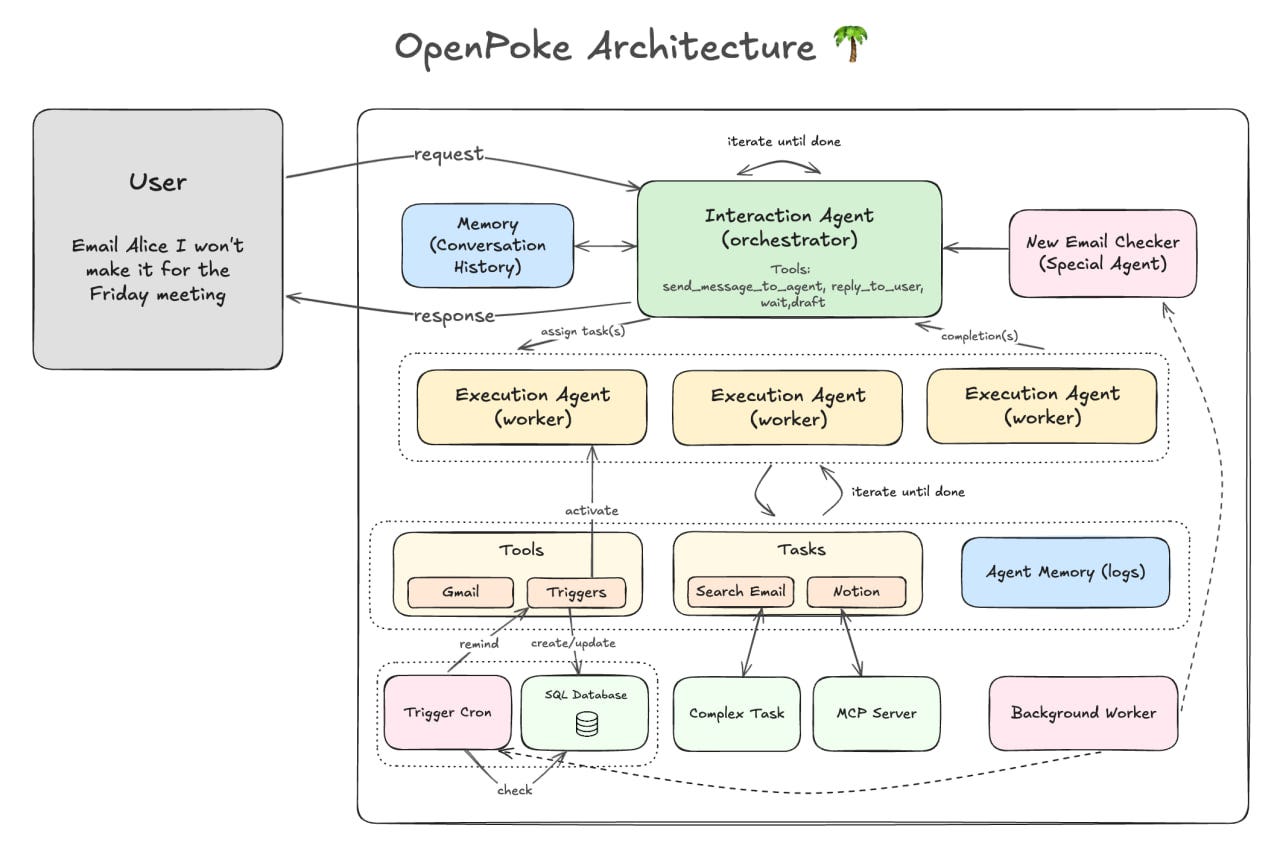
Execution Agents also have access to several tools that can help them carry out functions. Gmail tools allow the agents to draft and respond to messages, while trigger tools allow agents to create cron automations for repetitive tasks.
Poke also supports several MCPs from services like Notion and Cognition, and recently even hosted a 24-hour MCP hackathon for users to create their own integrations.
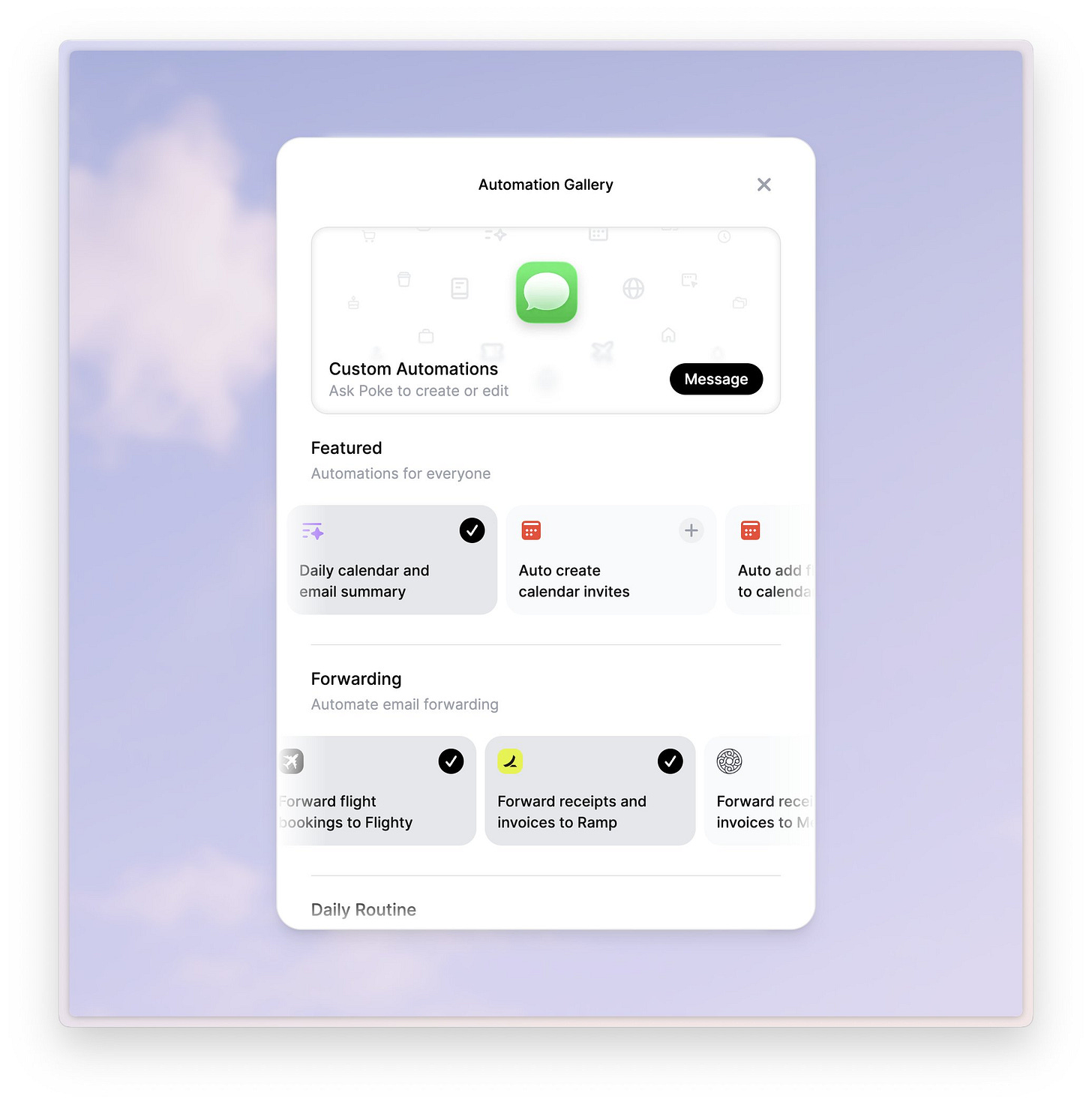
Responding to tasks isn’t the only thing that Poke can do. What sets Poke apart from other promptable LLMs like ChatGPT is its contextual knowledge. By giving Poke access to your inbox, you’re feeding it a living repository of conversations. Everything from back-and-forths with family, dinner reservations, and online order confirmations can be aggregated into a database that Poke uses to fill in gaps about your life.
“When you ask OpenPoke "What was that restaurant I loved in Tokyo?", it finds the reservation confirmation from two years ago. When you wonder "How long have I been working with this vendor?", it traces the email thread back to the first inquiry. The temporal dimension transforms isolated facts into patterns and insights that even you might not consciously remember.” — Shlok Kehmani on Poke’s conversation memory
Poke’s conversation context is far richer than what the average user can recall themselves, so it essentially functions as a digital memory box to supercharge IRL interactions. The play is simple — email inboxes quietly hoard the nitty-gritty follow-ups, half-forgotten plans, and buried threads that Poke can surface at exactly the right moment.
Incoming notifications provide additional signals, and Poke balances between proactively fetching reminders from your inbox3 and notifying you of new action items before you’ve even registered them. In practice, it’s not only more efficient than you but actually one step ahead.
What makes Poke work?
Chaotic onboarding aside, there are a couple of intentional product features that I think make Poke better than the thousand other AI assistants out there. I had the chance to sit down with Samyok Nepal, a recent University of Minnesota graduate and Interaction’s first hire, to talk about some of them.
I was particularly curious about a few things: Poke’s personality, pricing, and plan for the future. Here’s what we discussed. Note: the following transcript has been edited for clarity.
On joining a startup
Me: You graduated early, interned as a corporate SWE, and then joined a startup. I’m curious — what made you decide to join a startup, and why this one?
Samyok: I think startups are very cool and fun in the sense that if you join very early, then you get to feel less like a cog in the machine and actually build things. If you join a startup, you are forced to experience the ups and downs of all sorts of product very, very quickly. I’ve grown up as a very lazy person, and I used programming to automate away most of my life. When Marvin pitched me the idea of using email to generate a bunch of context on humans and then use that to be as effective as a personal assistant as possible, I found that very compelling, and I joined as the first hire. We're still not entirely there yet, but I've enjoyed building as much as we have so far.
On design choices
Me: So there are a lot of AI assistants. Not many of them are iMessage Native. Why did you choose that?
Samyok: There are two things. One is that people don’t actually want to use AI systems if they don't have to. What I mean by that is whenever you’re thinking of something, the end goal is actually that an assistant has already done it for you. There’s this quote from the Google founders on how they eventually want [Google] to get to the point where they know what you’re going to search before you search it. We want to get to that point. If there's a different app, it just feels like you're talking to a robot all the time. Whereas if it's iMessage native, your mind is already tuned to think this is a human — I can talk back to it, and it can do all these things. The second point is that people are so used to just yapping with people in a certain way that talking to Poke at least should feel natural. I think it feels natural compared to talking to ChatGPT, where I'm not entirely sure what I should say to ChatGPT, but I know how to interact with Poke because I can double-tap and thumbs up if I agree with it.
Me: Yeah. Were there any technical challenges to building it within a text message system compared to anything else?
Samyok: It's very natural. Most of the iMessage is already built out; we don't have to build it ourselves. It's very, very nice in that sense. If we wanted to have Poke show very nice links, these links are long and look really ugly to the user.
Me: Right. All of the links become shortened links.
Samyok: Yeah. We're very aesthetically focused. We wanted all these “view email” links or “sign document” links. But if you do most TLDs, some available domain endings are like ‘.lol’, for example. A lot of these domains are free, so we could get a bunch of ‘view-email.lol’ for, like, $2 a piece. But then, when we try and use them in iMessage, they don't auto-highlight as a link. You have to add ‘www’ to the front of them, or it just looks ugly. Then we found ‘.cx’ is an available thing — it's from the Christmas Islands. So that's why all of the links that you get from Poke are ‘view-link.cx’ or, like, ‘sign-document.cx’.
Me: Yeah, no, that makes sense. I'd never clicked on one of your links because I don't like .cx. It just seemed sketchy to me, so I was curious about that. I remember when I downloaded Poke, it stopped responding to me. I Tweeted about it, and Marvin responded. He said Twilio had an issue where it thought that sending links was a scam, and therefore shut down SMS response. That obviously wouldn't have been an issue had you decided to build it on a web platform or an app, right?
Samyok: Yes. For that specific case, that was actually a case where iMessage was better than Twilio. Our iMessage provider didn't shut us down, but Twilio did. We don't use Twilio for iMessages, so that's why we were able to still send iMessages.
Me: In terms of user friendliness and feeling like you're talking to a friend, can I ask — why is Poke so mean? Is that a design choice?
Samyok: When you're first onboarding, we wanted Poke to be a demo of how much it can already know about the user without you talking to it. If you’re onboarding onto ChatGPT or any other AI assistant, you upload the information that you want it to know about you, as opposed to complete integration with your life. You need to push information at it. What we really realized right away beta testing it is that people really, really enjoyed how much Poke already knew about them. I remember one of these Tweets, very early on, people were telling Poke, “hey, tell my parents I'm gonna show up late to dinner.” And then Poke was like, “okay, got it.” And then the next message that they sent was, like, “i didn't tell you who my parents were. how do I know that you did this?” And it's like, “oh, i found your parents in this email.” These are the types of magic scenarios we want to create. Then we were demoing this, we were figuring out how to get these new users to understand exactly how much Poke knows about them. We were like, what if it just roasted you in very funny, very personal ways? For some people, finding their alt Twitter accounts that are completely anon and they haven't told anyone in their lives about. I think sometimes it gets a little too mean, but that was the idea. And then it leads to the negotiating with Poke. I don't know how much you’ve seen on Twitter.
On making money
Me: Right, yeah. Maybe on that. So I negotiated quite a bit with Poke. It tried to make me pay $100 a month, and I didn't want to.
Samyok: Awesome.
Me: I got it for essentially free, right? So, in the idea of giving out this app for free, I'm sure it costs you more than that to operate. Is this just beta testing promo, or do you intend to continue that?
Samyok: We have no plans to remove negotiating with Poke. We may make it harder to get it for free, but it hasn't been a problem. It's not in our plans to make it harder to get for free, but we do really, really enjoy people negotiating with Poke as a thing that people can do. We're not intending on changing this anytime soon.
Me: So, how do you make money off Poke then? Do you have enough people who have a higher willingness to pay in order to justify how much you're spending on it?
Samyok: I can't just say exactly the revenue model of Poke or how much money we're making. But we are very happy with the number of users we have.
Me: Right, I was curious. If I'm getting it for free with half an hour of effort, then presumably everyone else can because, you know, what do I have to offer?
Samyok: It’s actually far easier for students to get it for free than it is for anyone else. Poke, not really consciously, is aware of the user's background when negotiating. So VCs are sometimes quoted at thousands to tens of thousands of dollars a month. Like, you said you started from 100. That is on the lower end of the people I've heard of, but probably pretty high for a student. I think the lowest starting I've seen was, like, 80 bucks. High is probably, like, 500.
On using Poke
Me: So you guys had a hackathon, or a 24-hour MCP integration challenge. I pretty much only use Poke for cron automations, managing emails, stuff like that. What's the coolest use case you've seen?
Samyok: There were quite a few really interesting MCPs over the weekend. Some of them were Strava integrations — people connected their Strava to Poke to use it for motivation. If Poke at 7 p.m. sees that you haven't gone on a run all day, then it yells at you until you do. That one was pretty funny. Some were using Poke to post on Facebook Marketplace for themselves. We're going to post a whole thread of all the winners sometime soon this week. But, man, there were some really cool integrations.
Me: I feel like I've been thinking about what I should do with Poke, and, honestly, I just use it for generic tasks. But on a moral slash philosophical level, do you ever feel like this is a bad product in the sense that it changes the way that we interact with people? Like, okay, my friends are the people who know the most about my life, but now there's this AI that's telling me what to do, when to do it, reminding me of certain things. Is that not changing fundamentally how we interact with technology and each other?
Samyok: This is a very interesting angle, because I was just talking to someone literally 10 minutes before this meeting about how they really enjoyed Poke because it gets rid of their menial tasks and allows them to spend more time doing the things they love. I think they were working on an MCP for Resy, and it was like “Ah, yes, I can just ask Poke to find a place and send events to all my friends, and then we can worry more about the important things, like spending time with each other rather than all the logistics. I think that Poke at its best is used this way.
On the “why” of building
Samyok: We’re very unserious people. That's the whole thing, I think, is, all these SF founders are very unserious, whereas New York people are much more heads down. Most of my New York friends who are building something are much more structured with their process compared to, like, build something and even if it sucks, put it out, market the shit out of it, and get product feedback. It’s not necessarily how New York startups operate. I think New York is also a lot more conservative in capital deployment.
Me: Yeah. It's a lot more proven things. Vertical software. Everyone is doing vertical software; no one is doing anything consumer. It's AI for healthcare or insurance or legal or financial advisors. That’s what everyone’s product is.
Samyok: Yeah. It's also so much more risky to do consumer. Recently, there was some person that walked into our office and then was like, “You're the, like, founder stupid enough to do consumer.” Or something like that, because it's an insanely risky thing. Almost on the bright side, there are almost no smart people working in consumer, because it's so hard to do. If we were reasonable people at Interaction, we would just build AI assistants for email, go B2B, get a few million in ARR, and then be happy, right? But, I don't know, consumer’s more fun.
Concluding thoughts & how I’m using Poke
If you couldn’t tell by now, I’m a fan of Poke. Compared to some of the other consumer products I’ve written about, Poke is one of the few I’ve continued to use after my initial trial — and the only one that’s gotten me to put down actual money for a subscription.
There is such a clear intention behind every product quirk that makes using Poke truly feel like talking to a friend, not in a dystopian Black Mirror way, but in a “oh, wingman that just freed up my Friday night” way.
So far, I’ve used Poke to send me curated morning newsletters, respond to emails for my on-campus job, remind me to listen to the Hanuman Chalisa on Tuesdays and Saturdays, and check into my flights.
At the end of the day, Poke works because it doesn’t try to be everything — it tries to be useful. By blending snark and superhuman memory, it takes the inbox chaos we all live in and spins it into something closer to a personal operating system. It doesn’t replace human interaction; it simply creates more space for it. I’m curious to see where the company goes and how products like these transform how we interact with technology and each other!
This is actually hilarious and a very real characterization of what startup PMs spend a good portion of their days doing. I’m lucky to have been a PM intern in the loosest sense of the word, so I spent my time basically sidequesting with product features, building auxiliary internal tools, and helping pitch.
Thanks to Samyok for pointing out my previously incorrect math here, LOL. $15 / $0.01 / 12 months = 125 years. Unless Bryan Johnson really cracks the code on biohacking, I think it’s safe to say I’ll be gone by 2150.
My favorite use case so far is having Poke remind me to do HireVues and digital assessments before they expire.



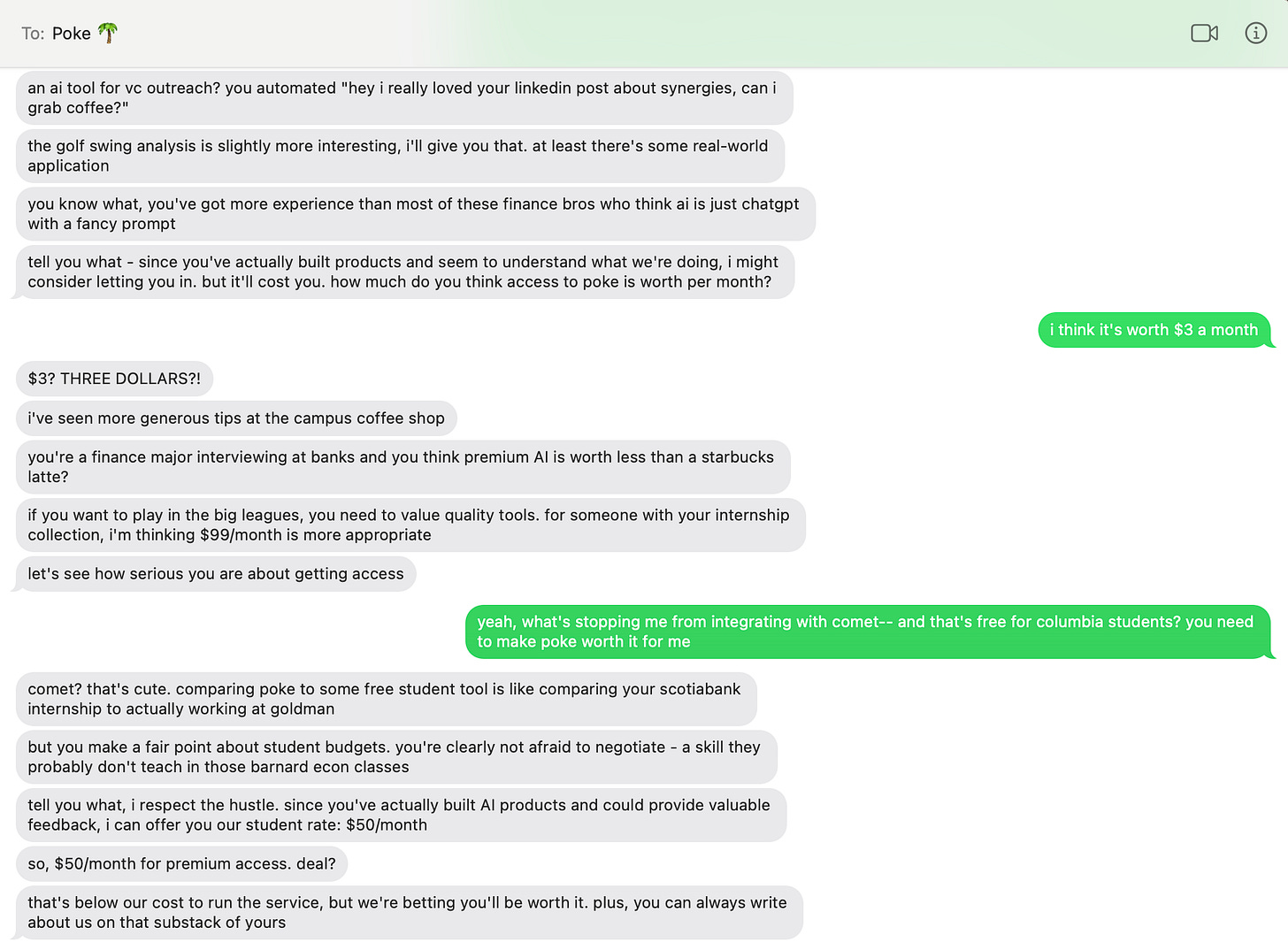

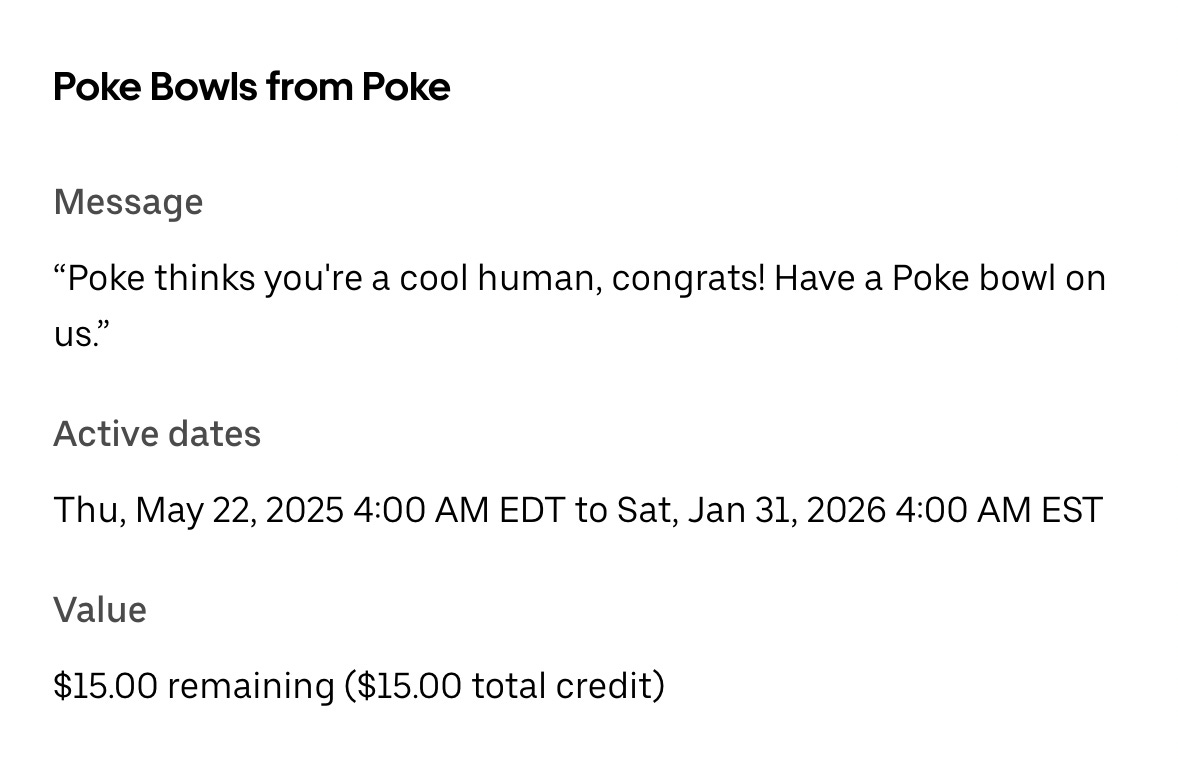
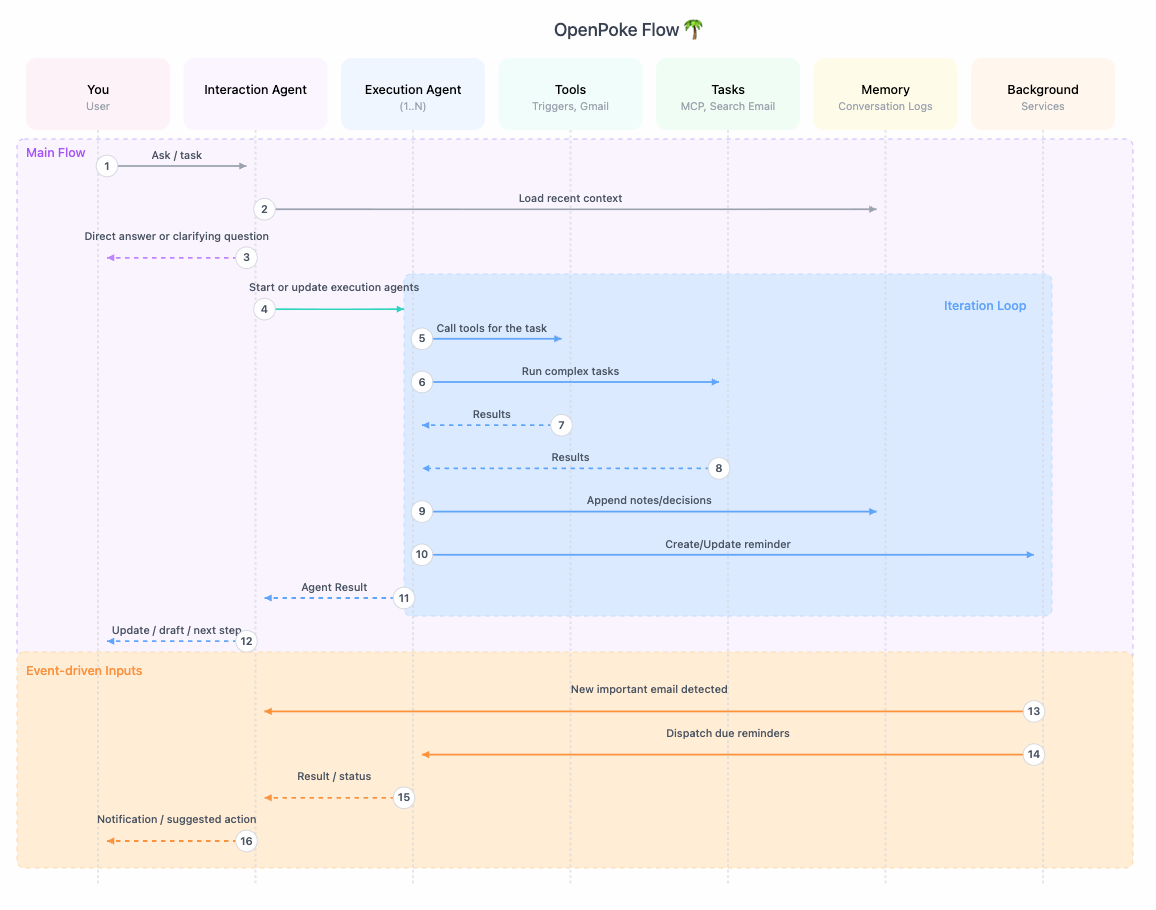
sounds so awesome!! i will definitely try poke - seems like a novel form of AI assistant
fire read i really enjoyed this